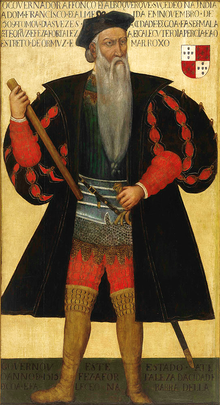
Back Conquistador Afrikaans كونكيستدور Arabic Konkistador Azerbaijani Konquistador BAR Канкістадоры Byelorussian Конкистадор Bulgarian Konkistador Breton Konkvistador BS Conquistador Catalan Конкистадор CE


Conquistadors (/kɒnˈk(w)ɪstədɔːrz/, US also /-ˈkiːs-, kɒŋˈ-/) or conquistadores[1] (Spanish: [koŋkistaˈðoɾes], Portuguese: [kõkiʃtɐˈðoɾɨʃ, kõkistɐˈdoɾis]; lit 'conquerors') was a term used to refer to Spanish and Portuguese colonialists of the early modern period.[2][3] During the Age of Discovery, conquistadors sailed beyond Iberian Peninsula to the Americas, Oceania, Africa and Asia, establishing new colonies and trade routes. They brought much of the "New World" under the dominion of Spain and Portugal.
After Christopher Columbus' arrival in the West Indies in 1492, the Spanish, usually led by hidalgos from the west and south of Spain, began building a colonial empire in the Caribbean using colonies such as Santo Domingo, Cuba, and Puerto Rico as their main bases. From 1519 to 1521, Hernán Cortés led the Spanish conquest of the Aztec Empire, ruled by Moctezuma II. From the territories of the Aztec Empire, conquistadors expanded Spanish rule to northern Central America and parts of what is now the southern and western United States, and from Mexico sailing the Pacific Ocean to the Spanish East Indies. Other conquistadors took over the Inca Empire after crossing the Isthmus of Panama and sailing the Pacific to northern Peru. From 1532 to 1572, Francisco Pizarro succeeded in subduing this empire in a manner similar to Cortés. Subsequently, other conquistadores used Peru as a base for conquering much of Ecuador and Chile. Central Colombia, home of the Muisca was conquered by licentiate Gonzalo Jiménez de Quesada, and its northern regions were explored by Rodrigo de Bastidas, Alonso de Ojeda, Juan de la Cosa, Pedro de Heredia and others. For southwestern Colombia, Bolivia, and Argentina, conquistadors from Peru combined parties with other conquistadors arriving more directly from the Caribbean and Río de la Plata-Paraguay respectively. All these conquests founded the basis for modern Hispanic America and the Hispanosphere.
Spanish conquistadors also made significant explorations into the Amazon Jungle, Patagonia, the interior of North America, and the discovery and exploration of the Pacific Ocean. Conquistadors founded numerous cities, some of them in locations with pre-existing settlements, such as Cusco and Mexico City. Conquistadors in the service of the Portuguese Crown led numerous conquests and visits in the name of the Portuguese Empire across South America and Africa, going "anticlockwise" along the continent's coast right up to the Red Sea, as well as commercial colonies in Asia, founding the origins of modern Portuguese-speaking world. Notable Portuguese conquistadors include Afonso de Albuquerque who led conquests across India, the Persian Gulf, the East Indies, and East Africa; and Filipe de Brito e Nicote who led conquests into Burma.
- ^ "conquistador". Merriam-Webster.com Dictionary.
- ^ Mary Hill, Gold: The California Story
- ^ Vanhanen, Tatu (1997). Prospects of democracy: a study of 172 countries. New York: Routledge. p. 112. ISBN 0-415-14405-1.
© MMXXIII Rich X Search. We shall prevail. All rights reserved. Rich X Search